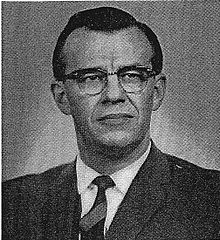Roger Hilsman
| Roger Hilsman, Jr. | |
|---|---|

Hilsman during the early 1960s
|
|
| 8th Assistant Secretary of State for Far Eastern Affairs | |
|
In office May 9, 1963 – March 15, 1964 |
|
| President |
John F. Kennedy Lyndon B. Johnson |
| Preceded by | W. Averell Harriman |
| Succeeded by | William Bundy |
| 2nd Director of the Bureau of Intelligence and Research | |
|
In office February 19, 1961 – April 25, 1963 |
|
| President | John F. Kennedy |
| Preceded by | Hugh S. Cumming, Jr. |
| Succeeded by | Thomas Lowe Hughes |
| Personal details | |
| Born |
November 23, 1919 Waco, Texas |
| Died | February 23, 2014 (aged 94) Ithaca, New York |
| Political party | Democratic |
| Spouse(s) | Eleanor Hoyt Hilsman |
| Children | 4 |
| Residence |
Manhattan, New York Lyme, Connecticut |
| Education |
United States Military Academy Yale University |
| Profession | Soldier, statesman, scholar, author |
Roger Hilsman, Jr. (November 23, 1919 – February 23, 2014) was an American soldier, government official, political scientist, and author. He served in Merrill's Marauders, and then with the Office of Strategic Services as a guerrilla leader, in the China-Burma-India Theater of World War II. He later was an aide and adviser to President John F. Kennedy and, briefly, to President Lyndon B. Johnson, in the U.S. State Department while serving as Director of the Bureau of Intelligence and Research during 1961–63 and Assistant Secretary of State for Far Eastern Affairs during 1963–64. There Hilsman was a key and controversial figure in the development of U.S. policies in South Vietnam during the early stages of U.S. involvement in the Vietnam War. He left government in 1964 to teach at Columbia University, retiring in 1990. He was a Democratic Party nominee for election to the U.S. House of Representatives in 1972 but lost in the general election. He was the author of many books about American foreign policy and international relations.
Hilsman was born on November 23, 1919, in Waco, Texas the son of Roger Hilsman, Sr., a career officer with the United States Army, and Emma Prendergast Hilsman. He lived in Waco only briefly, growing up on a series of military posts. He attended public schools for a while in Minneapolis, Minnesota. Hilsman spent part of his childhood in the Philippines where his father was a company commander and later commandant of cadets at Ateneo de Manila, a Jesuit college. His father was a distant figure whom the young Hilsman endeavored to gain the approval of, such as by choosing a military career. Back in the United States, Hilsman attended Sacramento High School in Sacramento, California, where he was a leader in a Junior Reserve Officers' Training Corps program and graduated in 1937.
...
Wikipedia
